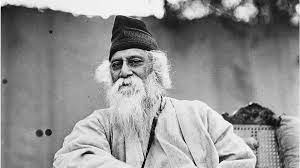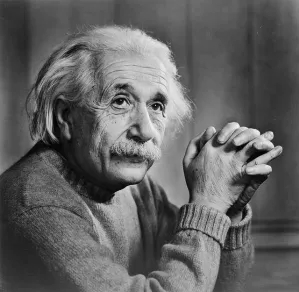
“But at the same time, anyone who is serious about science remains convinced that some kind of spirit manifests itself in the laws of the universe and that it is far superior to man.” In this way, doing science leads to religious motivations of a special kind, which are certainly quite different from the religiosity of someone more naive.”
Albert Einstein
Collision and meeting of truth and beauty
In his house in the suburbs of Berlin, the great scientist Albert Einstein hosted Rabindranath Tagore, the Indian philosopher and poet, one July day in 1930. These two colossuses of the human spiritual struggle started one of the most intellectually stimulating discussions of the 20th century and beyond, mainly exploring the age-old friction between religious and scientific thought, but also the point of their meeting. The growing secularity of the Western world and the millennial tradition of India at one table, in a rare state of osmosis and synthesis.
This clip of that historic conversation and masterful meditation on the concepts of consciousness, beauty and truth is just a part of the published book about this meeting of giants, “Science and the Indian Tradition: When Einstein Met Tagore”.
EINSTEIN: Do you believe in the divine as something isolated from the world?
TAGORE: It is not isolated. The infinite personality of Man understands the Universe. There can be nothing that cannot be subsumed under the human personality, and this is proof that the Truth of the Universe is also the human Truth.
I took scientific facts to explain it – matter is made up of protons and electrons, with gaps between them; but matter seems solid. Similarly, humanity consists of individuals who, however, have their own interconnections of human relationships that give the human world a living unity. The entire universe is connected to us in a similar way, it is the human universe. I pursued this thought through art, literature and the religious consciousness of man.

EINSTEIN: There are two different conceptions of the nature of the universe: 1. The world as a unity dependent on humanity. 2. The world as a reality independent of the human factor.
TAGORE: When our universe is in harmony with Man, the eternal, we know it as Truth, we feel it as beauty.
EINSTEIN: It is a purely human conception of the Universe.
TAGORE: There can be no other conception. This world is the world of men – the scientific view of it is the view of the scientific man. There is some standard of reason and enjoyment which bestows upon him the Truth, the standard of the Eternal Man whose experiences are permeated through our experiences.
EINSTEIN: It is the realization of the human entity.
TAGORE: Yes, one eternal entity. We must realize it through our emotions and activities. We have realized the Supreme Man who has no individual limitations through our own limitations. Science deals with what is not limited to individuals; it is an impersonal human world Truth. Religion understands these truths and connects them to our deeper needs; our individual awareness of Truth takes on universal significance. Religion applies values to the Truth, and we know this Truth well through our harmony with it.
EINSTEIN: Truth, then, or Beauty is not independent of Man?
TAGORE: No.
EINSTEIN: If there were no more human beings, Apollo Belvedere would no longer be beautiful.
TAGORE: No.
EINSTEIN: I agree with this conception in the case of Beauty, but not in the case of Truth.
TAGORE: Why not? Truth is realized through man.
EINSTEIN: I cannot prove that my conception is correct, but it is my religion.
TAGORE: Beauty is in the ideal of perfect harmony existing in the Universal Being; The truth is in the perfect understanding of the Universal Mind. We as individuals approach it through our own mistakes and misconceptions, through our accumulated experiences, through our enlightened consciousness – how else could we know the Truth?
EINSTEIN: I cannot scientifically prove that Truth must be conceived as a Truth that is validly independent of humanity; but I firmly believe in it. I believe, for example, that the Pythagorean theorem in geometry says something that is approximately true, independent of the existence of man. In any case, if there is a reality independent of man, there is also a Truth that is relative to this reality; and in the same way the negation of the first causes the negation of the existence of the second.
TAGORE: Truth, which is one with the Universal Being, must be essentially human – otherwise, everything that we individuals perceive as true could never be called truth – at least not the Truth that is called scientific and can only be reached through logical processes, or in other words, the organ of thought that is human. According to Indian philosophy, there is Brahman, the absolute Truth, which cannot be created by the isolation of the individual mind or described in words, but can be understood by the complete merging of the individual with its infinity. But such a Truth cannot belong to science. The nature of the Truth we are discussing is appearance – that is, what appears to the human mind as true and therefore human, may be called maya or illusion.

EINSTEIN: So, according to your conception, which may be purely Hindu, it is not an illusion of an individual, but of humanity as a whole.
TAGORE: Species also belongs to unity, to humanity. Therefore, the whole human mind understands the Truth; the Indian or European mind arrives at the same understanding.
EINSTEIN: The word “species” in the German language is used for all human beings, in fact, even monkeys and frogs could belong to it.
TAGORE: In science we move through the discipline of eliminating the personal limitations of our individual minds and thus arrive at that understanding of the Truth which is in the mind of Universal Man.
EINSTEIN: The problem begins with the question of whether Truth is independent of our consciousness.
TAGORE: What we call truth lies in the rational harmony between the subjective and objective aspects of reality, both of which belong to the super-personal man.
EINSTEIN: Even in our daily lives we are forced to ascribe a reality independent of man to the objects we use. We do this in order to connect the experiences of our senses in a reasonable and comprehensible way. For example, if no one is in this house, and yet this table remains where it is.
TAGORE: Yes, it remains outside the individual mind, but not the universal mind. What I perceive can be perceived by the same kind of consciousness that I possess.
EINSTEIN: If no one were in the house, the table would still exist – but, from your point of view, it is illegitimate – because we cannot explain what it means for the table to be where it is, independently of us.
Our natural point of view, regarding the existence of truth beyond humanity cannot be explained or proven, but it is a belief that no one can lack – not even primitive beings. We attribute superhuman objectivity to Truth; it is necessary for our existence, that truth which is independent of our existence and our experience and our mind – although we cannot say what it means.
TAGORE: Science has proven that a table, as a solid object, is an apparent object and that therefore what the human mind perceives as a table would not exist without that mind. At the same time, it must be recognized that the fact that ultimate physical reality is nothing but a multitude of separate rotating centers of electrical force also belongs to the human mind.
In understanding the Truth, there is an eternal conflict between the universal human mind and the same mind threatened in the individual. The eternal process of reconciliation is carried out in our science, philosophy, ethics. In any case, if there were a Truth absolutely unrelated to humanity, then it is completely non-existent for us.
It is not difficult to imagine a mind for which sequences of things occur not in space but only in time, like sequences of notes in music. for such a mind, the conception of reality is akin to musical reality in which Pythagorean geometry can have no meaning. There is a reality of paper that is infinitely different from the reality of literature. To a kind of mind such as the mind of a paper-eating butterfly, literature is completely non-existent, but to the human mind literature has a greater value of Truth than paper itself. Similarly, if there were a Truth that had no sensory or rational relation to the human mind, it would forever remain nothing as long as we remain human beings.
EINSTEIN: Then I am more religious than you!
TAGORE: My religion is the reconciliation of the super-personal man, the universal human spirit, in my individual being.

Leave a comment